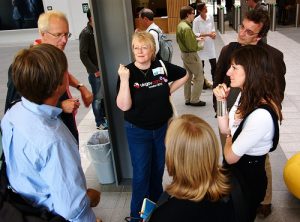ScotGov Camp

Last weekend I went to my first unconference ; ScotGov Camp in Edinburgh. I had pretty high expectations as I always follow the London camps. There was real mix of people there – folks from Huddle, various Government orgs, Greener Leith, Openly Local, Learning Pool, We Make Sense, Firmstep, South Lanarkshire council, Helpgov, East Ayrshire Council, Flock local, Edinburgh council, Womens Aid, Digital Scotland and the NHS.
Last weekend I went to my first unconference ; ScotGov Camp in Edinburgh. I had pretty high expectations as I always follow the London camps. There was real mix of people there – folks from Huddle, various Government orgs, Greener Leith, Openly Local, Learning Pool, We Make Sense, Firmstep, South Lanarkshire council, Helpgov, East Ayrshire Council, Flock local, Edinburgh council, Womens Aid, Digital Scotland and the NHS.
As always, hat tip to Dave Briggs for keeping us on our toes and making the room laugh. He kicked the day off with a blank agenda that quickly filled up with topics from around the room.
I stuck a post it up there about Big Society in Scotland and introduced the session by summarising my experience at The Future of Conservative Thinking in London ; an event that ended with “The Big Scottish Question” …
You can watch the session on the video below ; featuring @kateho, @wemakesenseux ,@greenerleith, @improvementmike, @peterashe, @bretthusbands, @ScotGovCamp, @suchprettyeyes, @flocklocal, @cal444 …
Lot’s of interesting points of view and thank you to everyone for coming along! For anyone wanting to know more about this stuff Carolyn recommended The Selfish Society: How We All Forgot to Love One Another and Made Money Instead – it seems to be a good resource for understanding how can we get back to basics.
The conclusion of the conversation was summarized by Peter reinforcing that it’s not really optional ;
“If we keep going the way we are going we will have to build a 600 bedded hospital in Scotland every 3 years – starting in 2016″
This is a very difficult time for Scotland but one that is full of opportunity. Although, this optimism did waver at times with much discussion around the barriers we face and how this affects people without the capacity and resources – the end result being this should be about delivering services equally and social justice!
So how do we cause change? Will we even use the phrase the Big Society – probably not? You can read a write up of the session here. We choose to buy into this idea or we choose to ignore it – regardless things have to change, in a big way and fast…summed up nicely by Brett;
“We can only do what we can do . We can choose to do it and that’s it.”
I then hung out in the Digital Scot session ran by Michael Fourman who started the conversation by asking the room “How can Scotland keep up with the rest of the UK?” I was surprised to hear that Glasgow has an under 40% uptake of broadband , compared to Aberdeen and Edinburgh having over 70%. Although it is something we think about alot over @Mypolice – we see evidence that many of these communities struggle to put food on their dinner table but have Virgin TV.
But what does “disconnectedness” really mean? How does effect people’s lives? I agree that being digital is not an add on – it is communication that is part of an infrastructure. Someone used the analogy of transport to describe Digital Scotland with fibres under the road, lots of people travelling for different reasons in different ways. But is it just enough to give people a computer and give them broadband? What about learning?
“it’s not about connectivity – it’s about content”
Inspired by Mary from Learning Pool six of started our own little session in the afternoon to talk about how we can get more young people into government. I now know that the average age of someone who works in a local authority is 47 years old and there is no one in Birmingham council under the age of 25…
The people in the room agreed that the way councils work is removed from the way young people work so it seems alien to them. We wondered if councillors feel responsible for spending tax payers money during their daily lives? the way MP’s are being encouraged to do?
@cal444 told us about her trip to her local primary school where she asked some ten-year olds “What does the council do?” and the response really wasn’t great, considering they deliver over 800 services. One lad claimed “They pay the rent when we run out of money” …
It seems to be a recurring conversation in a local authority to ask “Why do I have to do it this way?” and hear “Cos it’s the way we have always done it”
So the message is let’s do things differently and don’t ask why just do it